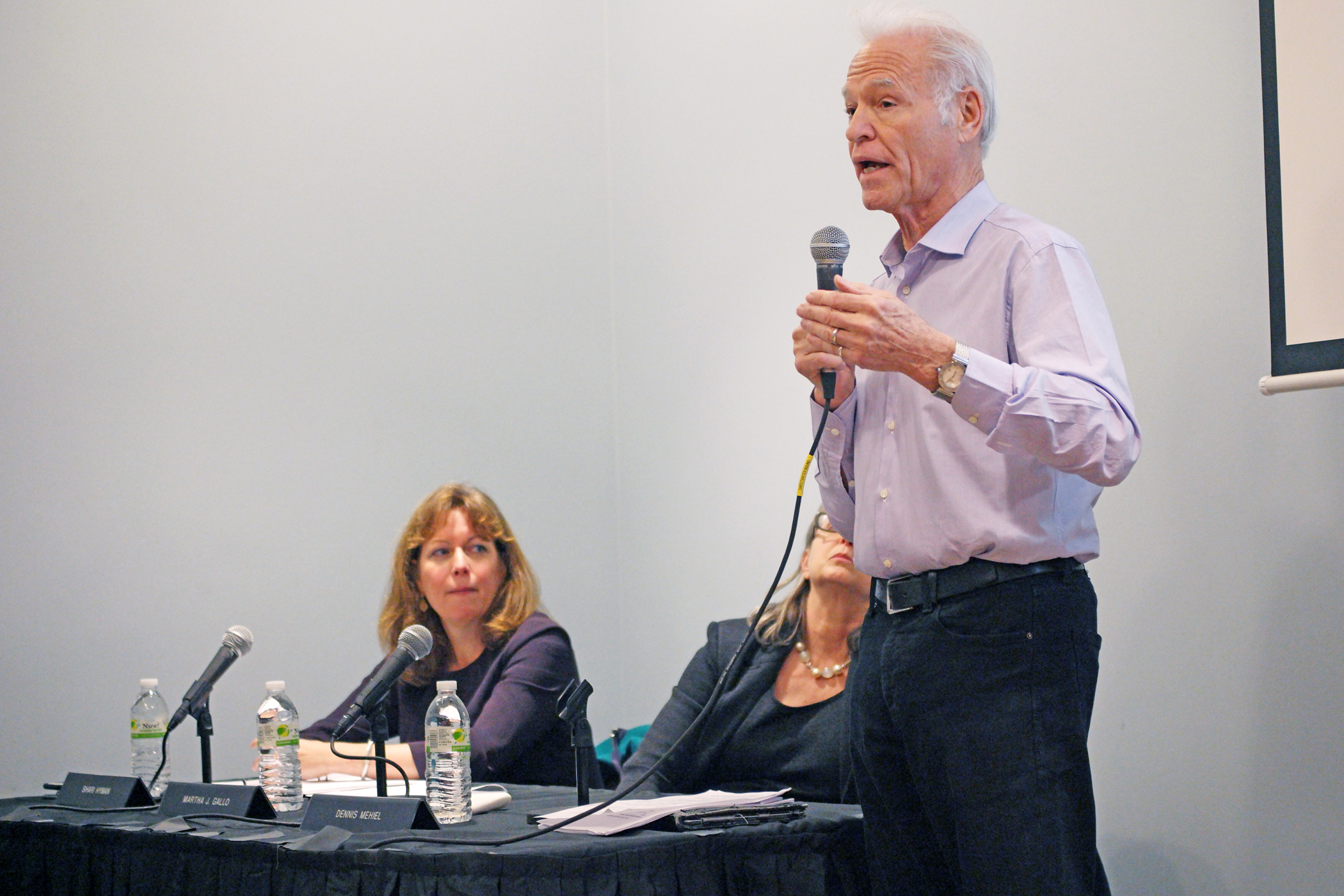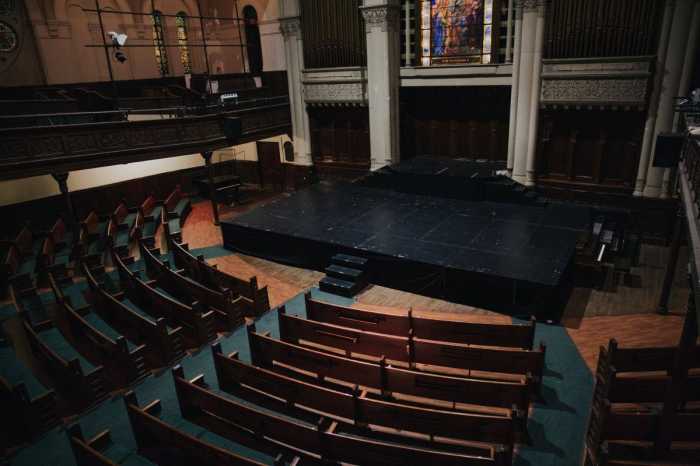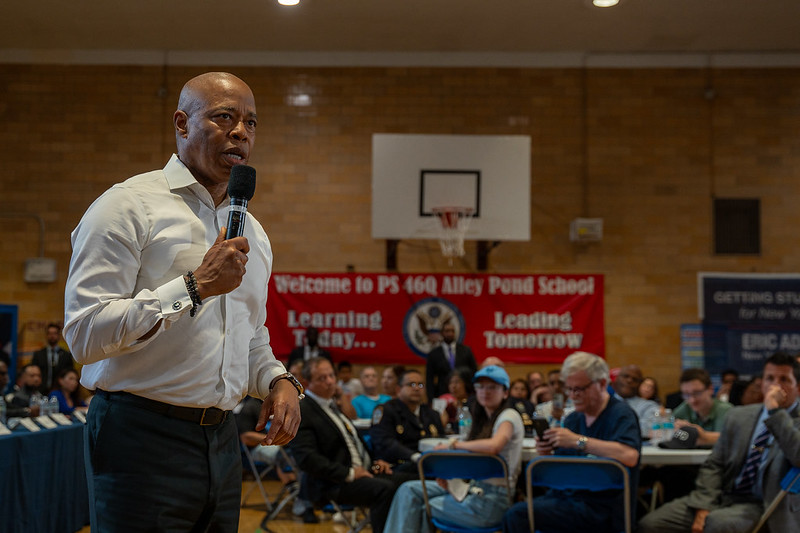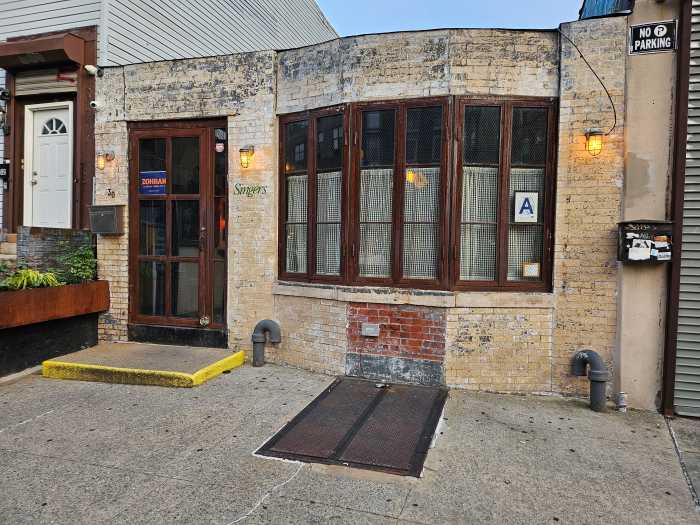
Battery Park City Authority board chairman Dennis Mehiel, right, joined by board president Shari Hyman, left, and member Martha Gallo, take questions from residents at a BPC town hall last year — until now the only chance residents had to address board members.
BY COLIN MIXSON
The Battery Park City Authority experienced an unexpected change of heart Wednesday morning, when board members voted unanimously to allow public comment at board meetings — reversing its earlier dismissal of the suggestion by pols and locals.
BPC residents who have long complained about the authority’s less-than-transparent policies were shocked by the board’s uncharacteristic about-face, according to one community leader.
“I’m pleasantly surprised,” said resident and Community Board 1 chairman Anthony Notaro. “This is a very positive step.”
The BPCA will now allow up to 10 members of the BPC community to address the neighborhood’s ruling council during board meetings under the new policy. Area residents will have two minutes each to speak and will not have to restrict their comments to subjects on that meeting’s agenda.
Speakers will be required to sign-up by 5:30 p.m. the day before a scheduled meeting, leaving them with about a day to review the board’s agenda, which it’s required to post 48-hours in advance of its executive gatherings.
Elected officials and many BPC dwellers are hailing the authority’s decision as a big win. But some are not so optimistic, and would prefer to postpone celebrations until the public comment period can be observed in action.
“We really do need to see how well this will work,” said BPC resident and CB1 member Tammy Metzler. “It’s certainly a small opening of the door and a welcome shift, but how it’s executed will be very telling.”
The BPCA board is an unelected panel appointed by the governor that currently includes only one Battery Park City resident. This inherent lack of direct accountability gives the authority little incentive to pay attention to residents’ concerns, according to Ninfa Segarra, chairwoman of CB1’s BPC Committee.
“The authority’s structure is insular, not elected, and not representative of the community,” Segarra said.
In April, a coalition of state and city elected officials lead by state Sen. Daniel Squadron began pressing for the authority to allow public comment at board meetings, thereby giving locals a chance to address the full board whenever it meets to make decisions. Before the Oct. 19 decision, the only forum where residents could directly address board members has been the quarterly town hall meets where BPCA president Shari Hyman and board chairman Dennis Meheil hold court.
Giving residents a chance to comment at board meetings will allow locals to weigh in on authority decisions before they’re put to a vote — rather than just complain about them afterwards — and doing so may result in a considerable public relations boost for the BPCA, according to Notaro.
“What’s interesting is the community isn’t always opposed to the authority’s decision, but its process,” he said. “So there may be things where the community agrees or disagrees with the decision, however, we hear about it after the fact.”
Faced with the pols’ push for public comment in the spring, the BPCA initially offered what it considered a more practical compromise and voted to allow elected officials time to speak with the board during meetings, with authority spokesman Nick Sbordone arguing that fully public comment periods are unproductive and don’t allow for a substantive discussion between officials and residents.
“Unlike the public comment sessions of some other boards, where individuals read statement after statement to members who sit silently and without discussion, our new policy provides for actual engagement between the public’s elected representatives — on any matter those representatives feel appropriate to discuss — and the BPCA board in an open forum,” Sbordone said following the vote in June.
It’s unclear what prompted the sudden reversal, but Meheil did vow to “take it up again,” following an impassioned plea from Squardon to reconsider the policy at last month’s board meeting.
What seems certain, however, is that without considerable pressure from community members and elected officials, the authority’s board meeting’s would continue playing host to a silent audience, according to Segarra.
“We are very grateful to our elected officials for supporting participatory government, especially state Sen. Daniel Squadron,” Segarra said. “Without their active advocacy, this reform would not be in place.”




































